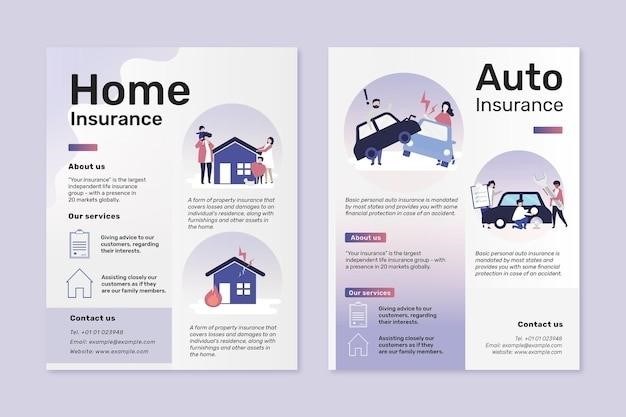Claims Adjuster Study Guide PDF⁚ A Comprehensive Guide
This comprehensive guide provides a roadmap for aspiring claims adjusters, covering essential skills, key study areas, recommended resources, and tips for exam preparation. It aims to equip you with the knowledge and understanding necessary to succeed in this challenging yet rewarding field. Whether you’re preparing for a licensing exam or seeking to enhance your professional skills, this guide offers a valuable resource for your journey.
Introduction
The world of insurance claims adjusting is a dynamic and demanding field, requiring a unique blend of technical expertise, interpersonal skills, and a deep understanding of insurance principles. As a claims adjuster, you play a crucial role in helping individuals and businesses navigate the complexities of insurance claims after an unexpected event. Whether it’s a car accident, a natural disaster, or a property damage incident, your ability to assess, investigate, and resolve claims fairly and efficiently is paramount. A comprehensive claims adjuster study guide is an invaluable tool for individuals pursuing a career in this field, providing the necessary knowledge and skills to excel in this demanding profession.
Essential Skills for Claims Adjusters
Becoming a successful claims adjuster involves mastering a diverse set of skills that go beyond technical knowledge. Effective communication is essential for building rapport with policyholders, understanding their needs, and conveying complex information clearly. Strong analytical skills are critical for evaluating claims, identifying potential fraud, and making informed decisions based on evidence. Furthermore, claims adjusters must possess exceptional organizational skills to manage multiple claims simultaneously, maintain accurate records, and meet deadlines. The ability to negotiate effectively is crucial for reaching fair settlements and resolving disputes amicably. Proficiency in technology is also vital for accessing and managing claims data, utilizing specialized software, and staying abreast of industry updates. These essential skills form the foundation for a successful career in claims adjusting.
Key Areas of Focus for Study
A comprehensive claims adjuster study guide should prioritize several key areas for in-depth learning. Firstly, understanding the intricate process of claims handling is paramount. This includes mastering documentation requirements, conducting thorough investigations, and effectively managing communication with all stakeholders. A deep understanding of insurance law and regulations is essential for ensuring compliance with legal frameworks and protecting the interests of both insurers and policyholders. Furthermore, analyzing insurance policies and contracts with precision is crucial for accurately determining coverage and benefits. Developing strong communication and negotiation skills is essential for interacting effectively with policyholders, building trust, and resolving disputes amicably. These key areas of focus provide a solid foundation for navigating the complexities of the claims adjusting profession.

Claims Handling and Negotiation
A thorough understanding of the claims handling process is essential for any aspiring claims adjuster; This encompasses a wide range of skills, including documentation, investigation, and effective communication. Mastering the art of negotiation is equally important, as claims adjusters often find themselves mediating between policyholders and insurers. This requires a delicate balance of empathy, assertiveness, and a keen understanding of legal and contractual obligations. A comprehensive study guide should delve into the nuances of each stage of the claims handling process, from initial reporting to settlement. It should also provide practical strategies for handling complex situations, such as disputes over coverage or the evaluation of damages. By gaining a strong foundation in claims handling and negotiation, aspiring adjusters can confidently navigate the challenges of this critical role.
Insurance Law and Regulations
Navigating the complex world of insurance law and regulations is a critical aspect of becoming a successful claims adjuster. A comprehensive study guide should delve into the legal framework governing insurance contracts, policy interpretations, and the rights and responsibilities of both insurers and policyholders. Understanding the various state and federal regulations that govern insurance practices is essential for making informed decisions and ensuring compliance. This includes knowledge of licensing requirements, claim reporting procedures, and the legal ramifications of fraudulent claims. A solid understanding of insurance law and regulations empowers claims adjusters to make fair and accurate assessments, protect the interests of all parties involved, and avoid costly legal disputes. This knowledge is a cornerstone of ethical and competent claims handling, ensuring that all parties involved in the process receive fair and just treatment.
Insurance Policy Analysis
A thorough understanding of insurance policy analysis is paramount for claims adjusters. This involves the ability to meticulously examine insurance policies, deciphering their terms, conditions, and exclusions. It requires keen attention to detail, as well as the ability to interpret complex language and apply it to specific claim scenarios. Claims adjusters need to be able to identify the relevant coverage provisions, determine the scope of coverage, and assess the validity of claims based on policy language. This includes understanding the different types of insurance policies, such as property, casualty, liability, and life insurance, and the unique features and limitations of each. Proficiency in policy analysis ensures that claims are assessed accurately, fairly, and in accordance with the terms of the policy, ultimately leading to efficient and equitable claim settlements.
Communication and Negotiation Skills
Effective communication and negotiation skills are indispensable for claims adjusters. They act as the bridge between the insurance company and policyholders, handling sensitive situations with empathy and professionalism. Mastering active listening skills is crucial for understanding policyholders’ perspectives and concerns, while clear and concise communication ensures that information is conveyed accurately and effectively. Negotiation skills are essential for reaching mutually agreeable settlements, balancing the interests of both the insured and the insurer. This involves understanding the principles of negotiation, such as compromise, persuasion, and conflict resolution, and applying them to real-world claim scenarios. Strong communication and negotiation skills enable claims adjusters to build trust, manage expectations, and resolve disputes amicably, fostering positive relationships with policyholders and ensuring smooth claim settlements.
Recommended Study Resources
Several valuable resources can assist you in your claims adjuster studies. Mometrixs Claims Adjuster Study Guide offers practice questions, video tutorials, and detailed study lessons, providing a comprehensive approach to exam preparation. For those pursuing the SPPA 30 certification, the SPPA 30 Public Adjuster Claim Handling Principles and Practices Study Guide, often considered the gold standard, is highly recommended. The Adjuster Examination Study Outline (Kentucky Property and Casualty Insurance License Exam Manual) provides a structured framework for understanding key concepts. Kaplan Financial Education Study Guides offer a comprehensive overview of insurance principles and practices. These study guides, combined with dedicated study efforts, can equip you with the knowledge and skills to excel in your claims adjuster career.
Mometrixs Claims Adjuster Study Guide

The Mometrixs Claims Adjuster Study Guide is a comprehensive resource designed to help aspiring claims adjusters prepare for their licensing exams. It covers a wide range of topics, including insurance principles, claim handling procedures, policy analysis, and legal aspects of insurance. The study guide features practice questions, video tutorials, and detailed study lessons, providing a comprehensive approach to exam preparation. The Mometrixs study guide is highly regarded for its effectiveness in helping individuals achieve success in their claims adjuster exams. Its user-friendly format and engaging content make it an ideal resource for both beginners and experienced professionals seeking to enhance their knowledge and skills.
SPPA 30 Public Adjuster Claim Handling Principles and Practices Study Guide
The SPPA 30 Public Adjuster Claim Handling Principles and Practices Study Guide is a specialized resource for individuals seeking to become public adjusters. It focuses on the unique aspects of public adjusting, including representing policyholders in their dealings with insurance companies. The guide covers topics such as claim negotiation strategies, policy interpretation, and the legal framework surrounding public adjusting. It is often considered a valuable resource for those seeking to pass the SPPA 30 exam, which is a requirement for obtaining a public adjuster license in many states. The guide’s comprehensive coverage of public adjusting principles and practices makes it an essential tool for individuals pursuing this specialized area of insurance claims management.
Adjuster Examination Study Outline (Kentucky Property and Casualty Insurance License Exam Manual)
The Adjuster Examination Study Outline, part of the Kentucky Property and Casualty Insurance License Exam Manual, is a specific resource designed for individuals preparing for the Kentucky insurance adjuster licensing exam. It provides a detailed breakdown of the exam’s content, covering areas such as insurance principles, policy analysis, claims handling procedures, and Kentucky-specific regulations. The outline acts as a guide, highlighting the key topics and concepts that will be assessed on the exam. It also offers a structured framework for studying and preparing for the specific requirements of the Kentucky licensing process. By utilizing this study outline, aspiring adjusters in Kentucky can gain a focused understanding of the exam content and increase their chances of success.
Kaplan Financial Education Study Guides
Kaplan Financial Education, known for its comprehensive test preparation materials, offers study guides specifically tailored for the insurance industry. These guides are designed to provide a structured and focused approach to learning, covering key concepts and principles related to insurance claims adjusting. Kaplan’s study guides often include practice questions, detailed explanations, and effective study strategies to help individuals prepare for licensing exams and professional certifications. While the specific content of their claims adjuster study guides may vary, they generally focus on core areas such as insurance law, policy interpretation, claims handling procedures, and risk management. By utilizing Kaplan’s resources, aspiring adjusters can gain a thorough understanding of the industry and enhance their readiness for professional success.
Online Resources for Claims Adjuster Study
The digital age has revolutionized learning, and claims adjuster study is no exception. A wealth of online resources is available to supplement traditional study methods, providing flexibility and convenience. Websites dedicated to insurance education offer comprehensive study materials, including articles, video tutorials, and interactive quizzes, covering various aspects of claims adjusting. Online forums and communities allow aspiring adjusters to connect with peers, share experiences, and seek advice from experienced professionals. These online platforms often host discussions on specific topics, legal updates, and industry best practices, providing valuable insights and a collaborative learning environment. Additionally, online practice exams and simulations can help assess readiness for licensing exams and build confidence in handling real-world scenarios. By leveraging these digital resources, individuals can enhance their understanding, expand their knowledge base, and prepare effectively for their claims adjuster career.
Tips for Successful Claims Adjuster Exam Preparation
Navigating the claims adjuster exam requires a strategic approach to ensure success. Start by familiarizing yourself with the exam format and content, understanding the areas of focus and the types of questions you’ll encounter. Create a study schedule that allows for consistent and dedicated learning, allocating ample time for each subject area. Use a variety of study materials, including textbooks, practice questions, and online resources, to gain a comprehensive understanding of the concepts. Active recall techniques, such as flashcards and self-testing, can enhance memory retention and help identify knowledge gaps. Seek out study groups or online communities to engage with peers and benefit from shared experiences and insights. Practice time management skills by simulating exam conditions, ensuring you can complete the exam within the allotted time. Stay calm and confident during the exam, and remember to review your answers thoroughly before submitting. By following these tips, you can increase your chances of passing the claims adjuster exam and embarking on a successful career in the insurance industry.
The journey to becoming a successful claims adjuster involves a commitment to continuous learning and professional development. This guide has provided a framework for your preparation, highlighting essential skills, key study areas, and recommended resources. Remember, the claims adjusting profession demands a thorough understanding of insurance principles, strong communication skills, and the ability to navigate complex situations with empathy and fairness. By utilizing the resources and strategies outlined in this guide, you can equip yourself with the knowledge and confidence to excel in this rewarding career. As you progress, continue to seek out opportunities for professional growth, stay informed about industry trends, and cultivate a commitment to ethical practices. The path to becoming a skilled and respected claims adjuster is within your reach.